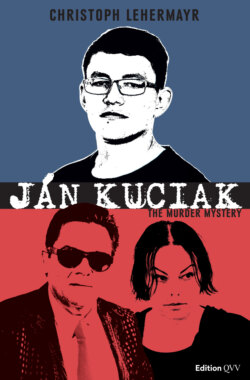Читать книгу Ján Kuciak - Christoph Lehermayr - Страница 8
На сайте Литреса книга снята с продажи.
The children of socialism
ОглавлениеIn his mind, Kuciak probably goes through his research over and over again as he hurries on in the cold. He follows a route that’s already familiar to those planning an attempt on his life. From the office by bus to the station, and from there aboard the regional express that comes hourly from Vienna on to the town of Galanta; around a half-hour journey. Then the last few kilometres by car to his house. It’s Kuciak’s daily routine – and his killers are aware of it. Without noticing or even suspecting it, Kuciak has been being shadowed. Photos which will be secured much later show him leaving the offices, waiting for the bus and even at home, renovating his house. His murderers know who he is, what he looks like and where he lives. They have access to data that has come direct from inside the security apparatus. On orders from the very top, a “spider” of Kuciak has been downloaded and passed on. The term is police jargon for a network of relationships with the wanted person at the centre, complete with address, car registration number and any entries in the criminal records. Lines lead from the centre to information about family members. Ján Kuciak has been spied on, shadowed and screened. And today, the 21st of February 2018, he’s due to die.
Outside the station in Galanta a woman with shoulder-length brunette hair is waiting for him: Martina Kušnírová, his fiancée. Both the same age, the pair met in 2013 when they were students at the university in Nitra, and they’ve been a couple ever since. In about two months, on 5th May, they plan to get married. Until then, they’re busy with preparations for the big day. Kušnírová has spent the afternoon at home. She’s been on the internet, looking for nice labels for the wine bottles at the wedding. Later she’ll call her mother, who’d confessed the day before to taking out an extra loan for the wedding. “But Mum, that’s not necessary,” says Kušnírová, annoyed, “Janko and I have enough money put aside.”
Her mother is a widow, and has had to scrimp and save her whole life just to make ends meet for herself and her two children. For the Kuciaks, with three children, it was also often a struggle to get by, in spite of all their hard work. When the mother fell pregnant with her first child Ján in 1989, everything that had once seemed certain for the family changed. As her belly grew, outside the rotten “Real Socialist” system was crumbling. Ján Kuciak was born on 17th May 1990 into a different country: the Velvet Revolution had been accomplished, the system had been toppled, Václav Havel was president, a new era had begun – and everything was going downhill. Especially Slovakia, which in 1993 became independent from the wealthier Czech part of the country, was looking into an economic abyss. Many of its desolate factories closed, and soon one in every three people was out of work. All of that makes the parents even prouder of their children. They’ve made it – Kuciak as an up-and-coming journalist, Kušnírová as an archaeologist. Right now she should be at excavations in the east of the country, and not standing at the station waiting for her fiancé. But the snow that’s been falling for days and the cold that has central Europe in its grip has thwarted her plans. In the parking area in front of the station is an old dark-green VW Passat station wagon, a 2003 model, which the couple bought a while ago and which has been giving them problems ever since. The day before, Kuciak had been unable to unlock it with the remote control. A defective battery, his brother-in-law-to-be had surmised, correctly, on the phone last night. It’s after half past six in the evening as Kuciak gets off the train and hugs his fiancée. In the dark he manages to open the trunk of the Passat, climb through it, open the hood and take the battery home to charge it.
